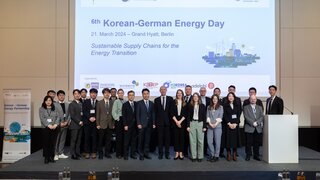6th Korean-German Energy Day

The 6th Korean-German Energy Day (KGED) took place on Thursday, March 21st 2024, on behalf of the German Federal Ministry for Economic Affairs and Climate Action (BMWK) and the Korean Ministry of Trade, Industry and Energy (MOTIE) as a physical conference in Berlin. It was co-organized by adelphi, the Korean-German Chamber of Commerce and Industry (KGCCI), the Korea Energy Economics Institute (KEEI), Korea Institute for Energy Technology and Planning (KETEP) and H2Korea. The event brought together over 100 representatives from government, business and science to discuss supply chains for renewable energy technologies and hydrogen.
The KGED was opened by Udo Phillip (State Secretary, BMWK), Namho Choe (Vice Minister, MOTIE), Dr. Martin Henkelmann (CEO & President, KGCCI), Hyeon Chel Kim (Director General Europe, KOTRA) and Kyoungsoo Lee (Director, MOTIE). They all underlined the importance of resilient and sustainable supply chains for achieving the carbon neutrality objectives of Germany in 2045 and Korea in 2050. Additionally, the potential and relevance of Korean-German cooperation between stakeholders from politics, civil society and industry on this common challenge were emphasized, as both countries have strong industries, ambitious decarbonization pathways and only limited domestic resources.
The first morning session took a closer look at hydrogen supply chains with insightful presentations on current policy developments in Germany by Dr. Falk Bömeke (BMWK) and in Korea by Geonyun Kim (H2Korea). In the following panel discussion moderated by Dr. Kathrin Goldammer (Reiner Lemoine Institute), the participants highlighted the common challenges Germany and Korea have in ramping up the hydrogen economy and securing sufficient supply. Industry representatives then shared perspectives on hydrogen transport and utilization. Peter Eckhardt (Reederei F. Laeisz) discussed the shipping of ammonia and hydrogen. While the long-distance shipping of hydrogen is related to many challenges and inefficiencies, ammonia is the more viable derivative as it has more favorable properties and readily available infrastructure. The role of hydrogen and ammonia for energy generation in Korea was presented by Dr. Byungkyu Choi (Korea Western Power). In his presentation many use cases of hydrogen in diverse sectors were shown.
The afternoon session discussed the topic ‘supply chains for renewable energies’. Isabel Geppert (IEA) outlined the global status quo on supply chains for renewable energy technologies. Her analysis showcased that there is no one-size-fits-all solution but that solutions must be adapted to country’s specifics. In the enclosing panel discussion moderated by Lena Ruthner (adelphi), the panelists highlighted that diversification of supply chains can be achieved through building up manufacturing capacities and incentivizing the processing of rare earths e.g., through state aid. Moreover, dependence of supply chains can be reduced by using less materials and by increasing reuse and recycling. International partnerships can take on a special role in addressing the issues by facilitating supply chain diversification but also provide funding for the development of supply chains.
Next, representatives from industry and research have presented solutions for sustainable consumption of raw materials. Leonie Papp (Fraunhofer ISE) has presented her research on organic photovoltaics and discussed their performance as well as possible future application scenarios for instance in agricultural contexts. Jin Ho Jein (Human Composite) explained the issues with decommissioning current wind blades and outlined how reuse can be enabled. Dr. Timo Siemers (Duesenfeld) explained their innovative lithium-ion batteries, which can be fully recycled without CO2 emissions. Last, Sung Ryeol Han (KEPCO KDN) presented management solutions for power quality management in the Korean electric power system.
To wrap up the 6th KGED, moderator Jana Narita (adelphi) and Beatrix Massig (BMWK) discussed the German strategy in achieving sustainable and resilient supply chains both concerning renewable energies and hydrogen. She particularly emphasized the potential for strategic cooperation and mutual learning between Germany and Korea in making supply chains more resilient and sustainable.